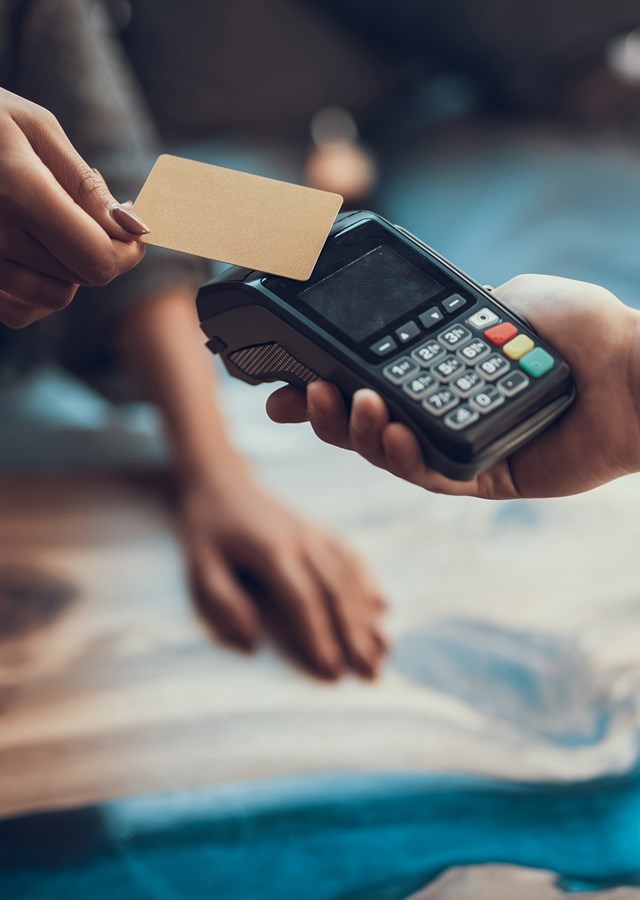Debt and money worries can feel overwhelming, but you're not alone, and there’s always a path forward. Whether it’s credit card debt, student loans or personal loans, taking control of your finances is possible. With the right approach and a clear plan, you can reduce your stress and make steady progress to addressing your debt.
This guide will help you understand the practical steps towards managing your debt and working towards financial freedom with confidence.
Learn more about:
- What is debt
- Types of debt
- Priority debts
- Common sources of debt
- Debt repayment methods and plans
- How to repay a debt quickly
- How debt affects your credit score
- Avoiding debt in the future
- Debt and mental health
- Who to contact for support
What is debt?
Debt is money that is owed to another person or organisation that must be paid back. Most debts come with additional costs, like interest, and often have a set timeframe for paying them back, which can add to the stress of managing them.
Types of debt
Debt can be associated with credit cards, personal loans, overdrafts, mortgages and more. You may have come across the terms ‘unsecured’ and ‘secured’ debt…
Unsecured debt
Unsecured debt is not backed by any collateral (assets) or protected by a guarantor (someone who promises to pay a borrower's debt if the borrower defaults on their loan obligation). This includes credit cards, bills and personal loans. If unsecured debt is not paid off, the people you owe can’t take your assets, but it may damage your credit score and make it harder to borrow money in the future.
Secured debt
Secured debt is a loan backed by collateral, such as a house, car or other asset. Secured loans are often used for larger purchases like cars, as they give the lender more security and reduced risk. Interest rates on secured loans are usually lower, however lenders can call in the asset if the loan is not repaid.
Good debt vs bad debt
Debts are not all the same; some can be classed as ‘good debt’, whilst others are labelled as ‘bad debt’. Good debt could be seen as an investment that helps to achieve greater value or a goal, such as a mortgage or student loan. Bad debt refers to money borrowed to buy items or services that don’t generate value or have long-term benefits, making it more difficult to pay back. Bad debt usually costs more, with high interest rates on items that reduce in value.
What types of debt should be paid off first?
There are a few considerations when planning to pay off debt and it can be confusing and difficult to know where to start. Dealing with ‘priority debts’ first is a good idea. These are the debts that carry the most serious consequences of not paying them off. If you’re at risk of losing your home or energy supply, it’s important to think about these debts first. These include:
- Mortgage and rent payments
- Gas, electricity and other utility bills
- Council tax
- Any court fines.
Understanding the impact of interest rates
It’s worth remembering that debts with higher interest rates will cost you more in the long run – the higher the percentage, the more you’ll end up paying back. Store cards have very high interest rates, and you’ll be able to find this rate on your statement. Paying back at least the minimum amount on store cards and credit cards will ensure that you don’t face additional charges. Paying back debt with the highest interest rate first will minimise further debt.
Common sources of debt
It’s not difficult to find yourself in debt. The rising cost of living, sudden unforeseen expenses or a job loss can see bills quickly mount up. Common debts you might encounter include:
- Mortgage: You’ll pay an agreed figure each month, including interest, over a term of around 25 years, on average. If repayments aren’t made in full or on time, your lender could sell your property to collect what’s owed to them. Mortgage debt is not necessarily seen as ‘bad’ debt, as there is a repayment agreement based on your income.
- Council tax: An annual fee paid to your local authority, based on your home’s value and the number of adults living there. It’s usually split into 10 monthly payments, but it can also be 12.
- Student loan: You don’t have to make repayments while studying, but by law, you must repay your loan once you earn over a certain amount (threshold). You may be able to defer payments if your income drops lower than the threshold.
- Car finance: Usually paid back in monthly instalments over a fixed term, including interest. Different car finance types include hire purchase, personal contract purchase and personal contract hire.
- Credit card: Tied to a spending limit with monthly bills. All credit cards charge interest on purchases, unless you pay it off in full each month. Cards with attractive introductory offers will increase to a higher interest rate at the end of the offer, and you’ll still need to pay back the minimum amount due each month.
- Store card: These finance agreements are linked to a specific shop. They usually have high interest rates along with an initial incentive to encourage you to sign up. Interest rates can be very high, and some stores add fees for missed payments.
- Personal loan: A fixed amount, borrowed from a bank or creditor. Paid back in fixed amounts over an agreed number of months.
- Buy now, pay later: These are unsecured personal loans and allow you to pay for things in instalments. Popular providers include Klarna and Clearpay, sometimes offering a 0% interest deal for a fixed time. This means that you won’t pay interest if you pay the loan back in time.
- Payday loan: Commonly used for unexpected expenses, money is paid straight into your bank account. They are short-term loans that need to be paid back on your ‘payday’. Payday loans are expensive, and while they may appear to solve a short term cash flow problem, their interest rates are high and many have hidden fees, making the loan difficult to pay off.
Calculating your total debt
You’ll find all your debts by looking at your bills and checking credit reports. You may need to contact creditors to ask for balance statements to be sure of your current total.
To understand your total debt and how much you’re paying off each month, you may find it helpful to calculate your debt-to-income ratio. This looks at how much of your monthly income is needed for paying off debt. Add up your regular monthly payments and divide that total by your monthly income before tax. This will help you with planning ahead.
Creating a budget to help pay off your debt
Creating a budget will allow you to feel more in control of your money. Understanding all the money that comes in and goes out each month will help you create a realistic budget to show where your money is going and where you can spend less.
There are lots of online tools that can help you set a budget, including our budget calculator and spreadsheet templates, to help you manage your finances.
Debt repayment plans and methods
With the right information, you’ll be able to find a way of repaying your debt that suits you. It might not be easy or quick, but having a plan can give reassurance and an incentive to work towards. There are many different approaches to reduce your debt, and your preferred method depends on your payoff goals.
Avalanche method
This focuses on paying off debt with the highest interest rate first. Once that is cleared, you’ll move onto the next highest interest rate. This method means you’ll pay less interest overall.
Snowball method
This method pays off the smallest debt first. Once that’s cleared, you take the money you were putting towards that payment and roll it onto the next smallest debt. This continues until your debt is cleared.
Consolidating debt
Debt consolidation sees all your debt from multiple sources gathered into one monthly account, making it simpler to manage. Debt consolidation may help you pay off your debt faster, and at a lower cost, however it’s far from a quick-fix – you’ll still have to pay it off in full and there are upfront fees and costs. You’ll also need to meet the requirements of the lender to apply for a debt consolidation loan. Consolidating debts may temporarily reduce your credit score, but this will improve as long as you make your payments on time.
Balance transfers
Moving debt from a product that is charging you interest to one with a 0% interest offer can help you clear debt and save money on interest. However, if you don’t pay off the balance by the end of the introductory offer, you’ll start to pay interest. You’ll also have to pay a fee to transfer a balance, and you’ll still need to pay the minimum each month.
Debt management plans (DMP)
These are flexible, informal arrangements between you and your creditors, with one set monthly payment divided between them. DMPs are managed by a provider who will deal with all your creditors and arrange your monthly payment. You’re not tied into a timeframe, and can cancel if you need to. Having one set payment may help with budgeting, but it may take longer to pay back your debt.
How to pay debt off quickly
There is no quick fix to paying off debt, but it may be helpful to have a plan, so you can see your progress. Simply acknowledging your debt is the first step, and then understanding the next steps needed to pay it off as quickly as you can. You may want to pay off more than the minimum you owe each month, or look at other ways of boosting your income, or reducing your expenses.
Selling belongings
Selling items of value can release money, helping you to pay off your debts more quickly. Jewellery and antiques may swiftly bring in some extra cash, and while larger items like cars or property may take longer to sell, they will make a greater impact. Make sure you have permission from any joint-owner, and use a reputable method of selling. You don’t have to sell your possessions to clear any debt.
Lowering expenses
Tracking your spending will soon show where your money is going and give you a realistic view of your habits. You’ll be able to see areas to reduce your outgoings, such as cancelling any unused subscriptions or identifying areas where you can cut back. Creating a budget and sticking to it will help lower expenses and prioritise your debts until they are paid off.
Negotiating with creditors
If you’re struggling, you may be able to negotiate lower monthly payments with your creditors. This could be a temporary measure, or a permanent reduction. You’ll need to prove why you can’t afford the current payments and show a household budget including your income and costs. This is more straightforward if you have two or three creditors. If you have more than four or five, a more structured debt repayment plan may be a better fit.
Debt settlement companies
These organisations can negotiate with your creditors and possibly reduce your debt. A debt settlement offer (DSO) provides an alternative solution if you can’t afford your debt, and avoids bankruptcy. You offer to pay creditors one lump sum, less than the total amount owed, instead of monthly payments, with the creditors then forgiving the remaining debt balance. This means that they receive some of what they are owed upfront, rather than waiting for monthly payments over an extended period. A debt settlement company will, however, charge a fee for negotiating on your behalf. It’s worth speaking to a debt charity like StepChange to understand your options.
Staying motivated during debt repayment
It’s easy to lose motivation and feel down when you’re worrying about paying off your debt.
- Finding a plan that works for you will help you to keep going.
- Setting yourself a budget and tracking your spending will reassure you that you’re on the right track.
- You could set yourself some small goals and celebrate achieving them.
- Ask someone to be an accountability partner so they can celebrate any milestones with you.
- Listening to success stories will remind you that it is possible to be debt-free, even if you’ve still got a little way to go.
How debt affects your credit score
Your credit score is a number that reflects your credit history. This allows lenders to assess the level of risk involved in lending to you. Having outstanding debt, missing payments and being linked to others with a bad credit score will all significantly reduce your credit score. This will make it more difficult to borrow money in the future. Missed payments, defaults and actions such as County Court Judgements (CCJ), Individual Voluntary Agreements (IVA) and Debt Relief Orders (DRO) usually remain on your credit report for six years.
Avoiding future debt
If you’ve paid off your existing debt, you may want to put a plan in place to keep the weight of debt off your shoulders. Managing your money by creating a budget and sticking to it will help you to live within your means, only spending what you have. Developing a habit to save will gradually build up a fund of money that can be used in emergencies, and trying to avoid impulse purchases should keep those savings safe for when they’re needed. Keeping track of bills and paying off your credit card in full each month will mean you don’t fall behind, and being cautious of payment plans and attractive low interest rate deals should help you stay in control of your finances.
Debt and mental health
It’s natural for the pressure of debt to affect your mental health, and you’re not alone in worrying about money. Debt can lead to anxiety, stress and problems with sleeping, and this can affect your day-to-day life, including your work and family life.
It can be tempting to put off addressing your debt, but there is plenty of advice available – for your money and for your mental health. It’s so important to reach out to someone who can help you make a difference in both areas.
If you need to talk to someone, we’re here for anyone who works in the UK automotive industry and their families. Call us on 08081 311 333 or we have a live chat at ben.org.uk. Get in touch today, we’re here for you.
Debt support and resources
There are also many organisations who provide impartial and confidential debt advice, free of charge. They will ask you about your current situation and help create a plan based on your circumstances. You’ll be able to go at your own pace, so it’s not overwhelming, and understand the debt solutions and services that are available to you, and which would best suit your needs.
Citizens Advice have a lot of helpful information online, with advice around getting help with the cost of living and dealing with debt.
StepChange is a debt charity, providing free expert debt advice and offering tailormade solutions.
FAQ's
How long does it take to get out of debt?
The time frame depends on a few things – the amount of debt you have, the type of debt, how much you can afford to repay each month and any other actions you choose to take. It could take up to a few years.
Is bankruptcy used to get out of debt?
Bankruptcy can be used to get out of debt, but it doesn’t cover all debts. You won’t be able to include a debt if it started after you went bankrupt, and you may need to continue paying off some debts.
Will consolidating debt affect my credit score?
A debt consolidation loan will look the same as any other loan on your credit report. The initial loan application may have a temporary negative impact on your score, however if you make payments on time, it won’t negatively affect your credit score, in fact, it may help raise your credit score over the long term.
Should you save while in debt?
You probably won’t be able to earn more on your savings than you’re paying in interest on your debt, so it’s a good idea to pay off all your debts before you look at saving.
Is a student debt bad debt?
If you attend university and gain a degree which leads you into a career, a student loan can be seen as a good financial investment. You may earn more with a degree, and it may offer more career prospects. However, it shouldn’t be used for unnecessary purchases. Your student loan does not have an impact on your credit rating, and only needs to be paid back once you earn over a certain threshold.












